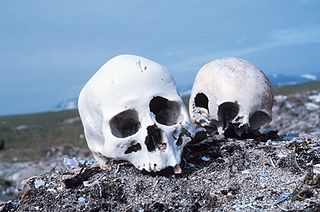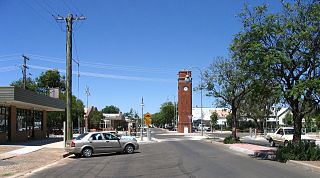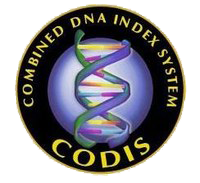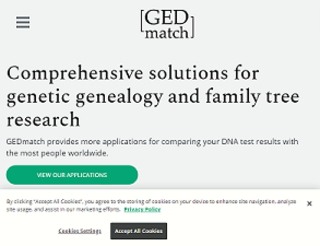Related Research Articles

DNA profiling is the process of determining an individual's DNA characteristics. DNA analysis intended to identify a species, rather than an individual, is called DNA barcoding.

Forensic science, also known as criminalistics, is the application of science to criminal and civil laws, mainly—on the criminal side—during criminal investigation, as governed by the legal standards of admissible evidence and criminal procedure.

CSI: Crime Scene Investigation, also referred to as CSI and CSI: Las Vegas, is an American procedural forensics crime drama television series which ran on CBS from October 6, 2000, to September 27, 2015, spanning 15 seasons. The series starred William Petersen, Marg Helgenberger, George Eads, Ted Danson, Laurence Fishburne, Elisabeth Shue, and Jorja Fox and was the first in the CSI franchise. The series concluded with a feature-length finale titled "Immortality".

Wee Waa is a town located on the north-western slopes of the New England region in New South Wales, Australia. The town is within the Narrabri Shire local government area and is on the Namoi River. Wee Waa is 41 kilometres (25 mi) north-west of Narrabri and 571 kilometres (355 mi) northwest of Sydney on the Kamilaroi Highway. At the 2011 census, Wee Waa had a population of 2,080.
Forensic identification is the application of forensic science, or "forensics", and technology to identify specific objects from the trace evidence they leave, often at a crime scene or the scene of an accident. Forensic means "for the courts".

The CSI effect, also known as the CSI syndrome and the CSI infection, is any of several ways in which the exaggerated portrayal of forensic science on crime television shows such as CSI: Crime Scene Investigation influences public perception. The term was first reported in a 2004 USA Today article describing the effect being made on trial jurors by television programs featuring forensic science. It most often refers to the belief that jurors have come to demand more forensic evidence in criminal trials, thereby raising the effective standard of proof for prosecutors. While this belief is widely held among American legal professionals, some studies have suggested that crime shows are unlikely to cause such an effect, although frequent CSI viewers may place a lower value on circumstantial evidence. As technology improves and becomes more prevalent throughout society, people may also develop higher expectations for the capabilities of forensic technology.
The Forensic Science Service (FSS) was a government-owned company in the United Kingdom which provided forensic science services to the police forces and government agencies of England and Wales, as well as other countries.
A crime laboratory - often shortened to crime lab - is a scientific laboratory, using primarily forensic science for the purpose of examining evidence from criminal cases.
The following outline is provided as an overview of and topical guide to forensic science:

CSI is a media franchise of American television programs created by Anthony E. Zuiker. The first three CSI series follow the work of forensic scientists as they unveil the circumstances behind mysterious deaths, while the fourth series, CSI: Cyber, emphasizes behavioral psychology and how it can be applied to cyber forensics.
A DNA database or DNA databank is a database of DNA profiles which can be used in the analysis of genetic diseases, genetic fingerprinting for criminology, or genetic genealogy. DNA databases may be public or private, the largest ones being national DNA databases.

Body identification is a subfield of forensic science that uses a variety of scientific and non-scientific methods to identify a body. Forensic purposes are served by rigorous scientific forensic identification techniques, but these are generally preceded by formal identification. This involves requesting a family member or friend of the victim to visually identify the body.

The University of Florida's (UF) online forensic science distance education programs cater to working professionals and students who have completed their Bachelor of Science degrees.

The Combined DNA Index System (CODIS) is the United States national DNA database created and maintained by the Federal Bureau of Investigation. CODIS consists of three levels of information; Local DNA Index Systems (LDIS) where DNA profiles originate, State DNA Index Systems (SDIS) which allows for laboratories within states to share information, and the National DNA Index System (NDIS) which allows states to compare DNA information with one another.
Forensic and Scientific Services (FSS) is part of Queensland Health and provides specialist scientific and medical analysis and independent expert advice in the state of Queensland, Australia. It is sometimes referred to as the John Tonge Centre.

Rebecca Nicole Johnson is an Australian scientist (geneticist) and science communicator. Since April 2015, Johnson has been Director and Chief Scientist of the Australian Museum Research Institute (AMRI), Sydney, the first female to be appointed to the role since the establishment of the Australian Museum in 1827. She is also head of the Australian Museum's Australian Centre for Wildlife Genomics, a wildlife forensics laboratory based at the Australian Museum.

Sunil Kumar Verma, is an Indian biologist and as of January 2018, a principal scientist at the Centre for Cellular and Molecular Biology, Hyderabad, India. Verma is primarily known for his contributions to the development of "universal primer technology", a first generation DNA barcoding method, that can identify any bird, fish, reptile or mammal from a small biological sample, and satisfy legal evidence requirements in a court of law. This technology has revitalised the field of wildlife forensics and is now routinely used across India to provide a species identification service in cases of wildlife crime. This approach of species identification is now known as "DNA barcoding" across the world.
Graham Leonard Ashton is an Australian police officer who was the Chief Commissioner of Victoria Police from 2015 to 2020. He also served in the Australian Federal Police for a long period.

GEDmatch is an online service to compare autosomal DNA data files from different testing companies. The website gained significant media coverage in April 2018 after it was used by law enforcement to identify a suspect in the Golden State Killer case in California. Other law enforcement agencies started using GEDmatch for violent crimes, making it "the de facto DNA and genealogy database for all of law enforcement," according to The Atlantic's Sarah Zhang. In May 2019, GEDmatch then tightened its rules on privacy by requiring users to "opt in" to sharing their data with Law Enforcement. In December 2019 GEDmatch was acquired by Verogen, Inc, a sequencing company dedicated to forensic science. A new version of the existing site currently in development will focus on solving crimes using the more than 1.2 million DNA profiles hosted on GEDMatch's platform.
The Special Honours Lists for Australia are announced by the Sovereign and Governor-General at any time. In 2003, a list of people received recognition for their parts in the response to the 2002 Bali Bombings.
References
- 1 2 3 4 Profile: Dr Linzi Wilson-Wilde, Science and Technology Australia. Accessed 27 November 2018.
- ↑ Moor, Keith (8 October 2012) Australian Federal Police were closely involved in the hunt for Bali the bombers, Herald Sun . Retrieved 27 November 2018.
- ↑ Name: WILSON-WILDE, Linzi Marianne, It's an Honour, Australian Honours Search Facility, Department of Prime Minister and Cabinet, Australian Government. Accessed 27 November 2018.
- ↑ Elliot, Tim (5 June 2010) Hunt was up against civil rights arguments, The Sydney Morning Herald . Retrieved 27 November 2018.
- ↑ Mills, Tammy (25 September 2016) How mass DNA screening caught a Wee Waa rapist and may solve Tracy Connelly murder, The Age . Retrieved 27 November 2018.
- ↑ (28 September 2011) University of Canberra graduates - Doctor of Philosophy, The Age. Retrieved 27 November 2018.
- ↑ Wilson-Wilde, LMA (2010) Species Identification in Wildlife Crime Investigation Using Diprotodontia - Introductory Pages, University of Canberra. Accessed 27 November 2018.
- 1 2 Price, Nic (15 June 2014) Fitzroy forensic scientist inducted onto Victorian Honour Roll of Women, Herald-Sun. Retrieved 27 November 2018.
- ↑ Quinn, Rod (21 October 2016) What are the latest advancements in DNA?, Overnights , ABC Radio. Retrieved 27 November 2018.